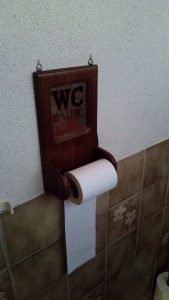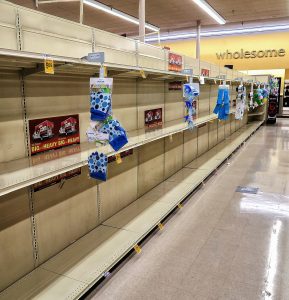By Nick Baldry

Source : Donald Trung Quoc Don
When it became apparent that the coronavirus had not only reached the shores of the United States, but was taking hold to such an extent that we needed to shut down society as we know it, there was one fairly universal reaction. Panic.
That panic manifested itself in a number of ways. A common one was panic purchasing. Commodities flew off shelves. In very short order, my local supermarkets were stripped of fairly obvious items such as canned food and bottled water as people rushed to make sure that they had enough to survive an unknown period of time where they wouldn’t be able to leave home. This was despite the fact that stores would remain open and well-stocked during the lockdown. Scarcity created fear that other products would become increasingly scarce and a vicious cycle took hold.
Other less obvious products were purchased in almost unprecedented quantities. A report from the Guardian newspaper on March 17th described lines at the doors of marijuana dispensaries and video game stores in San Francisco prior to the local shelter in place order going into effect, as people prepared to spend day after day at home. Maybe a little less unexpectedly, alcohol sales also climbed steeply. In the US they were up 55% for the third week in March compared to the same time in 2019, according to CNN.
And then there was toilet paper…

Source : Russ Allison Loar
I’ll be honest, if you had asked me at the beginning of the year what items I would have hoarded in a pandemic, I don’t think toilet paper would have made the list. Wine, definitely. Toilet paper would have been an afterthought at best.
Throughout the western world, we went potty over the stuff. Local Facebook groups were full of posts from residents asking for inside information on which supermarkets were getting a shipment in as they were down to their last roll or worse last few sheets. Some stocked up with a view to selling toilet paper at a markup, a practice that proved disastrous for one gentleman in Australia who tried to return $10,000 AUD worth of toilet paper and hand sanitizer that eBay was no longer letting him list for sale. The supermarket declined to offer him a refund. The toilet paper situation in Australia was apparently so dire that one newspaper printed a special edition with eight blank pages that could be ripped off and used in case of emergency.
Ultimately this was a staggeringly first world response to a pandemic. Toilet paper is not essential to survival. Water, yes. Food, yes. Wine, we’ll agree to disagree on that one. Toilet paper, no.
In the developed world we have the luxury of having at least one room in our home essentially dedicated to sanitation. We sit on the porcelain throne whiling away time on smartphones (at least 75% of us do according to a 2015 article and terrifyingly 63% of us have answered a call while using the facilities) safe in the knowledge that what we produce and any accompanying toilet paper will be whisked away cleanly and efficiently with a simple flush, never to be thought of again.
On the ground, in Niger, the need is far more fundamental. Instead of a rush on toilet paper, the need is toilets. Around 96% of people do not have access to sanitation, not even a basic latrine. People are left with no choice but to practice open defecation, a practice which is a key part of the lifecycle for diseases such as schistosomiasis and trachoma, as well as a variety of life-threatening diarrheal diseases.
This is all before we get to the implications of a pandemic like a coronavirus, a disease where one of the best defenses is handwashing – a simple intervention when you have access to clean water. When, like 61% of rural villagers in Niger, you don’t have access to such a basic resource as clean water, the potential for rampant spread is unimaginable.
Does the emergence of the coronavirus in Niger (which has confirmed 701 cases at the time of writing) mean there is a sudden need for wells and sanitation in Niger? No. The need is far from sudden, it has been there for generations. In a country where one in seven children dies before the age of five, where diseases linked to the lack of adequate sanitation have been and continue to be rife, coronavirus is just another on a depressingly long list of reasons why there is a need to fund wells, access to sanitation, and all of the other critical interventions Wells Bring Hope provides to people on the ground.
I’m not so worried about toilet paper. I have access to a toilet, clean running water, and other fundamental defenses against disease. Of course, the pandemic is a concern for myself and my family, but at least it isn’t exacerbated by a real threat of the diseases of poverty that threaten people throughout the developing world on a daily basis.
https://www.cnn.com/2020/04/01/business/alcohol-sales-coronavirus-trnd/index.html
https://99percentinvisible.org/episode/wipe-out/
https://www.thecut.com/2015/05/science-of-us-guide-to-bathroom-behavior.html


